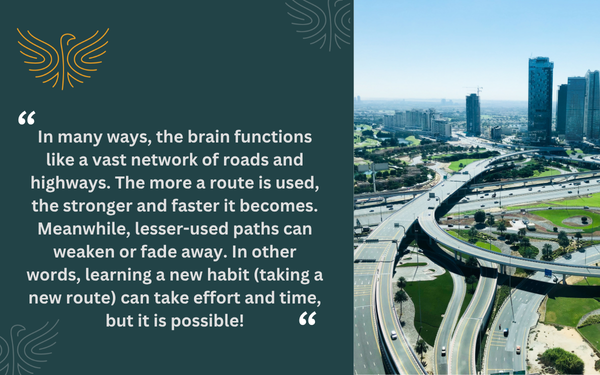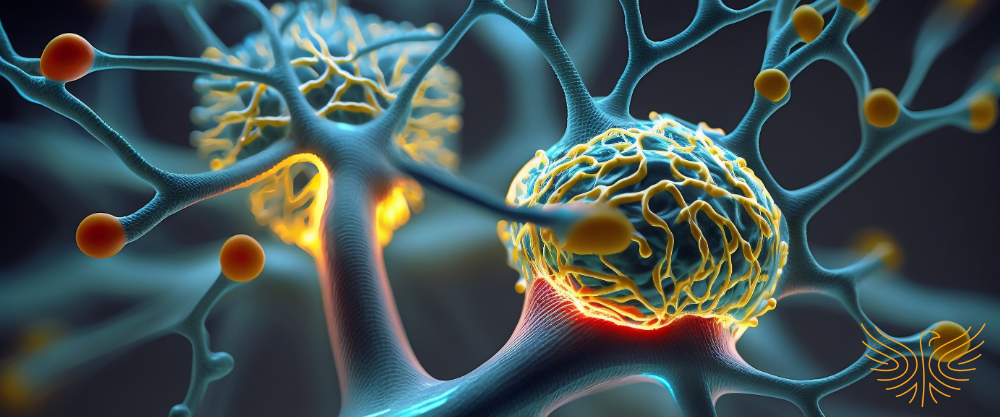Recovery from addiction involves more than willpower alone. However, in the midst of healing, neuroplasticity offers a powerful way to pave the path forward.
For years, scientists believed adult brains were fixed and unchangeable. Today, we know the brain continuously adapts throughout our lives1. And this discovery revolutionized the way we approach addiction treatment and recovery. Below, we uncover the ways neuroplasticity plays a role in recovery, as well as what it is.
_______________________________________________________
What is Neuroplasticity?
Neuroplasticity is the brain’s ability to reorganize itself by forming new neural connections2. The brain adapts its structure and function in response to our experiences and behaviors. This flexibility enables us to learn, heal, and develop new habits throughout our lives.
In many ways, the brain functions like a vast network of roads and highways. The more a route is used, the stronger and faster it becomes. Meanwhile, lesser-used paths can weaken or fade away. In other words, learning a new habit (taking a new route) can take effort and time, but it is possible!

With addiction, substance use alters the brain’s reward system pathways3. It teaches the brain to experience reward from these substances, thereby dimming other experiences that may have produced similar rewards and pleasures in the past. With repeated and chronic use, these pathways become stronger, and the voice to use becomes louder.
However, recovery creates opportunities to build healthier neural highways, replacing these old and unhealthy pathways with new and more balanced habits. In fact, the brain begins to heal as soon as substance use stops4. So, let’s take a closer look.
_______________________________________________________
How Does Neuroplasticity Contribute to Recovery?
Neuroplasticity supports recovery and healing in many different ways. Through different therapeutic approaches, you can undo old behavioral triggers and habit loops and create new ones that support your sobriety. In more detail, here’s exactly how neuroplasticity contributes to recovery from addiction.
Helps Rewire Old Habit Loops and Behavioral Triggers
Addiction creates automatic responses to certain cues, people, or emotions5. These are often called “triggers.” And these habit loops can feel overwhelming and uncontrollable at first. In fact, they often set the stage for relapse, especially when left unaddressed. However, neuroplasticity allows us to gradually weaken these connections and build new ones.
Each time you choose a healthy response over substance use, you are strengthening alternative pathways. Recovery activities, such as therapy, meditation, or exercise, help support the creation of these new neural networks. And, over time, these healthier responses become the brain’s preferred routes.
Environmental changes can further significantly support this rewiring process. For instance, avoiding triggering situations gives new pathways time to strengthen. Meanwhile, old addiction pathways begin to weaken from lack of use.
Yet, the brain needs consistent repetition to solidify these changes. At the same time, recovery isn’t about perfection but about persistent practice. As you go through this process, keep in mind that every positive choice contributes to lasting neural transformation!
Strengthens the Mind-Body Connection
Substance abuse often disconnects people from their physical sensations and needs. Yet, neuroplasticity helps rebuild awareness of the body’s signals and responses. This reconnection can, in turn, become a powerful tool for maintaining sobriety.
For instance, mindfulness practices activate brain regions responsible for self-awareness and emotional regulation6. Furthermore, regular meditation physically changes brain structure in measurable ways. And these changes improve the ability to recognize cravings without acting on them.
Additionally, physical exercise, like yoga, stimulates neuroplasticity while reducing stress and improving mood7.
As this mind-body connection strengthens, you end up developing better self-care habits. You might begin to recognize hunger cues, fatigue, and your emotional needs more clearly. And this awareness prevents the neglect that often accompanies active addiction, guiding you toward a healthier life.
Enhances Emotional Resilience and Reduces Stress
Chronic substance use damages the brain's stress response systems8. But recovery allows these systems to heal and develop healthier patterns, and neuroplasticity makes this all possible.
Throughout recovery, the brain learns new ways to process difficult emotions without turning to substances. For example, therapy provides tools, such as new and healthy coping mechanisms, that create alternative neural pathways for emotional regulation. These skills usually become more automatic with practice and repetition. And this can help reduce the amygdala’s reactivity (the area of the brain responsible for stress and fear) over time.
As these pathways improve, you simultaneously build emotional resilience and reduce stress. As a result, recovery becomes easier and more sustainable.
Improves Focus & Mental Clarity
Addiction impairs cognitive functions, including attention, memory, and physical coordination. However, cognitive work and the acquisition of new skills can help stimulate neural growth in areas affected by these conditions. In turn, focus, attention, memory, and cognition gradually improve, too. This can further guide you toward more purposeful and meaningful work and activities, supporting your recovery.
If you or a loved one is struggling with addiction, know that recovery is possible. No matter whether it’s your first or last time in recovery, our team at Freedom Recovery Centers (FRC) is here to help guide you toward lasting healing. Call us at 804-635-3746 or fill out our online form, and begin your journey toward a better life, starting today.
.svg)






.svg)

.svg)



.svg)
